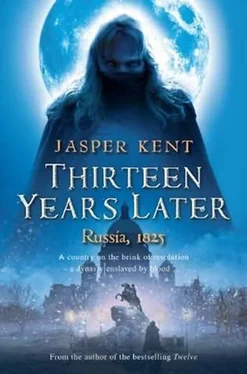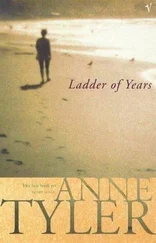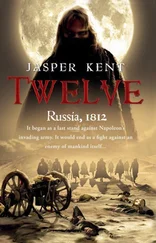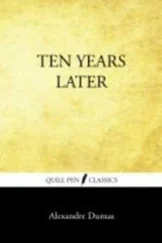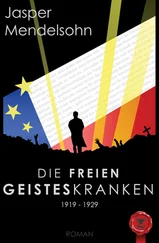He looked once again at the city’s skyline. As they moved upstream, he just caught a glimpse of the monument to Pyotr’s proud victory, where once, like Saint George, he had defeated a serpent. If only, like George, he had managed to kill it. The statue disappeared from view. It would be the last he saw of Petersburg, or of any real civilization, but he would get used to it.
Even so, he wished his final glimpse of a city could have been of Moscow. He’d always preferred Moscow.
SIBERIA. ON THE BANK OF A WIDE, REMOTE RIVER STOOD THE town of Irkutsk, fifty versts from Lake Baikal, five thousand from Moscow. It had been almost twenty-nine years since the day of the Decembrist Uprising.
Domnikiia toyed with the iron bracelet that encircled her wrist. She had worn it since 1828. Most of her friends – a small and exclusive circle – wore one. 1828 had marked one of the first, slight relaxations that the Decembrist exiles had been allowed – the removal of their leg-irons. It had been Pauline Anenkov who had come up with the idea of having the fetters reforged as a symbol of… who knew what? Some of the women had also had wedding rings made from the metal, but Domnikiia had not. As far as they knew, Marfa Mihailovna was still alive.
Many wives, and a few lovers, had come out to Siberia to support their exiled men. Originally, they had been a lot further east than this, and conditions had been indescribable. Aleksei and those others allocated to the second rank of conspirators – those who avoided the death penalty – had been sentenced to various periods of hard labour, followed by permanent exile. Aleksei was ordered to dig in the mines for twelve years; it was neither the longest nor the shortest sentence.
After that, life had become more tolerable, certainly for those men who had female companionship. There had never been any question of Marfa coming to join him, Aleksei had assured Domnikiia of that even before he left Petersburg. She had written, intermittently, for a few years, but after a while, there had been nothing. The same was true of Dmitry Alekseevich. Aleksei told Domnikiia all about Iuda – in his alter ego Vasiliy Denisovich – soon after she had come out east to join him.
Prince Volkonsky – Pyetr Mihailovich – had made everything possible. He seemed to show more concern for Aleksei than he did for his own brother-in-law, Sergei Grigorovich, though he knew Aleksei not to have truly been a supporter of the cause. Pyetr Mihailovich had ensured that money came to them out in Siberia, and – apparently – to Marfa and Dmitry, and, most importantly, to the Lavrovs.
It had been the most appalling decision that Domnikiia or Aleksei had ever had to make, tearing their hearts in two, but for Tamara’s own sake, they had abandoned her. It would have been misery for her to live in the conditions they at first suffered – though children had been born out here to the wives of exiles – and to live and grow in Moscow, stigmatized as the child of a Decembrist, without any hope of ever seeing her parents again would have been a pointless cruelty. Fortunately, the seeds of deception had already been sown.
Toma would grow up as Tamara Valentinovna Lavrova, daughter of Valentin Valentinovich and Yelena Vadimovna. Aleksei had smiled at the thought she would be Vadim’s granddaughter, but it was little compensation. Yelena had been saddened but supportive when the idea was put to her. Valentin had been surprisingly accommodating. He was not a cruel man and he loved Tamara as he loved any child. In his mind, she would be far happier as his own than as the daughter of Aleksei and Domnikiia. The regular payments from Volkonsky had been persuasive too.
As for Tamara herself, both hoped – and feared – that she had been young enough to forget them. They would never know if some memory of them lingered in her heart, but years of life under the name of Lavrova would obscure whatever of her true parents remained with her. And it was not simply the shame of having a Decembrist father they were protecting her from. If Toma had stayed with Domnikiia, in Petersburg, Siberia or anywhere, Iuda would eventually have made the connection. Would he have pursued the daughter, seeking revenge on the father? Aleksei had been certain that eventually he would. It wasn’t a risk they could take. At least Aleksei had been lucky enough not to have had the opportunity to say goodbye.
Volkonsky had written to them regularly. Letters in both directions were censored, but both Aleksei and the prince were wise enough to be able to write a great deal with few words. Almost every letter from Volkonsky contained a phrase along the lines of ‘Tsar Nikolai and Tsarevich Aleksandr are both in the rudest of health,’ or – less frequent but not uncommon – something like ‘The tsarevich was seen today inspecting the guard under the glare of the midday sun.’ Aleksei had not been so forward with Domnikiia over affairs of state as he had with regard to his home life, but she could make some vague guess as to the significance of the midday sun.
Since their periods of hard labour had expired, the Decembrist families had moved from town to town, but always with a tendency to head back west – and always having leaped through the hoops of bureaucratic approval. Tsar Nikolai was vindictive in his attitudes towards his would-be usurpers, but none of them could honestly swear that they would have behaved any differently in his shoes – a few of them swore it dishonestly. Many of them – Aleksei included – tried to better the lot of the Siberian peasants, through improvements primarily in agriculture and education. Aleksei knew nothing of farming, though he learned much, but he taught the local children Russian, French, Italian, German and even some mathematics. The fact that most of his mathematical examples involved predicting the trajectory of a cannonball did not discourage him, and the better of his students worked out how to transfer that knowledge to the problems they themselves faced in building, farming, fishing and so forth.
Volkonsky had died two years before. He had continued writing – and sending money – to the last, but it was through his brother-in-law that they had heard the news. He had been seventy-six – just five years older than Aleksei, and the news had been for him a memento mori. It was sad, but in terms of the practicalities of lessening the misery of their exile, he had already done his duty. There was no need for more money. Dmitry was a major, last thing they had heard. They knew nothing of Tamara – they had specifically instructed Volkonsky not to tell them; it would have been too painful – but she would be thirty-three by now, happily married, and no doubt with children of her own.
Domnikiia and Aleksei had themselves saved much of what Pyetr Mihailovich had sent them. They owned this house, never mind that it was made of wood and not stone. And they owned land, which Aleksei farmed. ‘We must cultivate our garden,’ Lyosha always said to her, and then told her she should read Voltaire – but she never did. What mattered was that they were contented, even if it was a life that neither had envisaged. True, it was horribly cold here in the winter, but that only reminded them they were in Russia. In the summer, it was usually pleasant – rarely too hot. Now it was somewhere between summer and autumn, and still comfortable to sit out in front of the house and gaze down to the river, even after sunset. Today it was particularly important that she could sit outside, because Aleksei had a visitor.
The old starets – a few years older than Aleksei, she would guess – had arrived on horseback. He looked in some strange way familiar to Domnikiia, but she could not place him. He had given her his name and she had, with ridiculous but somehow appropriate formality, gone to announce him to Lyosha. The old man had followed her into the house and Aleksei had seen and recognized him. He had rushed over – as best he could – and hugged the old man like a long-lost brother before she had been able even to repeat the name she had been given – Fyodor Kuzmich.
Читать дальше
